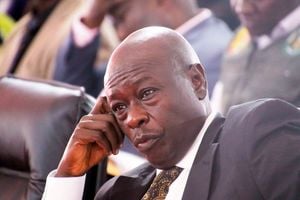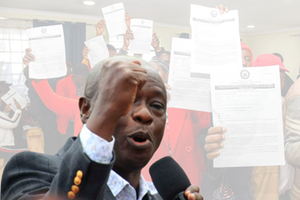
The late entertainer and marketing guru Kevin John Ombajo, better known as Big Kev.
| File | CourtesyNews
Premium
Court fails to recognise Will recorded by top entertainer Kevin Ombajo
Have you been thinking of recording your Will in a video to lower the chances of forgery and succession disputes? Then think again.
The death of celebrated entertainer and marketing guru Kevin John Ombajo, better known as Big Kev, has exposed a loose end in the succession laws as it emerges that audiovisual Wills cannot be implemented.
In addition, Justice Lydia Achode said audiovisual recordings do not count as oral wills.
Under Section 9 of the Law of Succession, oral wills are admissible in a court of law, but only if the person making the declarations dies within three months of stating their last wishes.
Even if the court had accepted Ombajo’s video as an oral will, it would still be inadmissible because the entertainer died more than six months after recording his last wishes in front of a camera.
Even then, oral wills cannot be used to revoke written ones, according to Kenyan laws.
The only way to revoke a written will is through another on paper.

Founder and CEO of event management agency True Blaq, Kevin Ombajo, popularly known as Big Kev, says the event presents a good break for Kenyan talent and an exciting occasion for fans who have never seen these artistes live. PHOTO | FILE
The decision of the court has come as a victory and precedent-setter for Ombajo’s widow, Tracy Kamene, but will leave the entertainer’s sister – Jacqueline Vivian Akinyi – disgruntled.
Ms Kamene sought to have a 2015 written will used to distribute her husband’s assets, while Ms Akinyi wanted the courts to rely on a video Ombajo recorded in his lawyers’ office in 2016.
Had the courts accepted the video will, Ms Kamene would have been the loser.
Ms Kamene said Ombajo painted her in bad light and disinherited her, despite them not having had serious differences in their marriage.
“The recording only surfaced as an afterthought and has many inconsistencies to be used in place of a written will,” Ms Kamene said.
She insisted that her husband asked her to implement the written will sworn in 2015.
Kenya is not alone in the legislation conundrum.
Australia and the US state of New Jersey started allowing audiovisual wills last year. The decision was only a result of the Covid-19 pandemic, which has increased the risk of death from physical interaction.
The two jurisdictions passed new laws, which allowed citizens to record their last wishes on audio or video for purposes of succession.
Kenya, however, still lacks laws and regulations to govern the use of audiovisual recordings as wills.
The initial plan in Ombajo’s case was not to entirely rely on the video will, but to have the contents transcribed and signed by the entertainer.
But Ombajo’s health deteriorated before the updated will could be put on paper and signed.
He died seven months after the video will was recorded.
Apart from challenging the admissibility of the audiovisual will, Ms Kamene argued that by the time the video was being recorded, her husband’s health had deteriorated and that he could have been manipulated to make changes.
Big Kev hit fame as a gospel singer in 1995 before setting up an events management and marketing company called Trublaq six years later.
Trublaq’s growth made Ombajo a pioneer and revolutionary in events management, as the firm would go on to bag big contracts.
He co-owned the events management and marketing company with Ms Akinyi.
In the contested video will, Ombajo sought to transfer all his shares in Trublaq to his sister.
Ombajo battled a brain tumour for more than a decade, and had more than 10 operations.
The tumour was diagnosed in 2010 and he died on July 29, 2017
Ombajo visited his lawyer Rosalinda Nduati of Anjarwalla & Khanna Advocates on February 20, 2015 to put his last wishes to paper.
The process went well, with the document being signed by witnesses.
The next year would become even tougher for the entertainer, as he was diagnosed with optic atrophy – a condition in which cells in the optic nerves decay, leading to blindness.
By the time Ombajo lost his sight in 2016, a lot had changed in his life.
The entertainer informed his sister of the video will that made changes to the document drafted the previous year.
Ombajo then took Ms Akinyi to his bank and made her a joint signatory to the accounts held.
He also gave his sister keys to a safe deposit box at the bank, and asked her to handle some of his personal affairs.
The tumour was growing and he travelled to India for treatment.
Shortly after returning from India in 2016, Ombajo called his lawyer and told her he wanted to update the will made in 2015.
This time, however, he agreed with Ms Nduati that the new will would be recorded in a video.
Ombajo recorded the video will at Anjarwalla & Khanna Advocates offices on December 23, 2016.
The wishes were witnessed by Ms Nduati and two other lawyers – Mr James Ngugi and Mr Edwin Mbaru.
Mr Ngugi was also a friend of Mr Ombajo, the two having known each other since 1989.
In an affidavit, Mr Ngugi said despite losing his sight, Ombajo was still of sound mind, with the entertainer’s usual humour still intact.
The lawyer also said Big Kev had agreed to have the contents of the video will put on paper after the 2016 Christmas holiday, after which the entertainer would sign it.
But by the time the festivities were over, Ombajo was unwell and would spend the next seven months in and out of hospital.
He died before the audiovisual will could be converted into a written one.
While the video will was revolutionary, Ombajo’s main aim was to go around the tragedy of losing sight in updating his wishes.
Ms Nduati copied the video will to a flash drive, which was then stored at Anjarwalla & Khanna offices.
After the recording, Ombajo called his sister and informed her of the updated will.
Shortly after his burial, Ms Nduati invited the entertainer’s family to her office and formally informed them of the video will.
Aside from the flash drive, Ms Nduati provided a certificate of electronic record to show that the video was legitimate.
The certificate showed that the will was recorded partly on Ms Nduati’s phone with the rest being shot by an Apple iPad.





